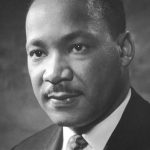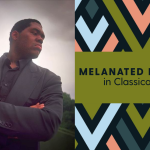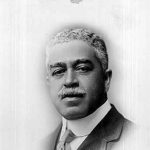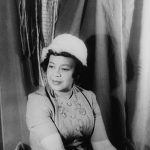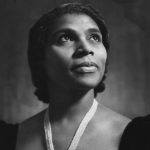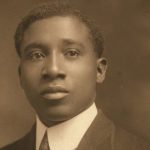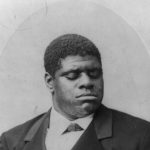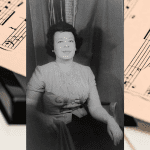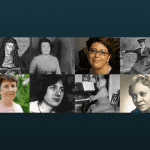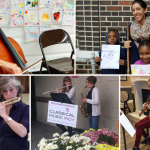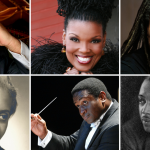MMCM S4E4: Leontyne Price: America’s Leading Lady in Opera
Joshua and Angela salute the illustrious career of opera soprano Leontyne Price. We hear three signature selections by Ms. Price and learn of her journey from Laurel, Mississippi, to capturing the attention and admiration of the world for her unparalleled vocal prowess and artistry. She remains a standard-bearer for opera singers globally.
Featured Music:
“Summertime,” from Porgy and Bess, performed by Leontyne Price
“O patria mia,” from Aida, performed by Leontyne Price and The Metropolitan Opera
“This Little Light of Mine,” by Margaret Bonds, performed by Leontyne Price
Angela Brown (00:00): Before we get started with this episode, we wanted to thank our listeners for your amazing support of this podcast. We can’t wait to bring you future episodes, but we need your support. Just go to givebutter.com/melanatedmoments to help share more stories of exceptional Black artists with thousands of listeners across the US and around the world. Joshua Thompson (00:27): And if you’d like more information on each episode, go to our website or follow us on social media. Angela Brown (00:33): Follow my foundation on Facebook @morningbrown or on the web at morningbrown.org. Joshua Thompson (00:41): And follow me Joshua Thompson on Instagram as @SockJoplin. Angela Brown (01:01): Hey everybody, we are back with another exciting, thought-provoking, and deep diving episode of Melanated Moments in Classical Music. I’m Angela Brown. Joshua Thompson (01:14): And I’m Joshua Thompson, and Angela I’m here for all of it. Do tell us what illustrious subject are you presenting to us today. Angela Brown (01:24): Well, Joshua, not only is she an American opera idol and my opera mom, in my head, she has been a trailblazer for Black women in opera for as many years, as I can remember when I was still at university, I remember talking to my career counselor about what I should pursue. I told him I envisioned myself singing on the stages of the world and he said to me, point-blank, “Every Black girl that comes through here wants to be the next Leontyne Price. Why don’t you try for something else?” Joshua Thompson (02:04): Uh, I know he didn’t! Angela Brown (02:05): Uh, yes he did, honey. I tell you he, but he didn’t realize what he said to me was a challenge. He did me a favor. See, he didn’t realize that the blood of my ancestors was flowing through my veins and that I took that a challenge and that Leontyne Price was my absolute idol. I remember seeing her on Saturday morning TV, right after Schoolhouse Rock. Remember that? Joshua Thompson (02:35): I do! I’m old enough. Yes. Yes. Angela Brown (02:38): And then when it would go off, Soul Train would come on. Okay. Right. It was this, uh, commercial, uh, by the United Negro College Fund with this beautiful Black woman with full lips and an Afro. And she was singing in her classical voice, “Reaching for the dreams that spell tomorrow. Another generations come in on. I see America.” Okay, let me calm down. All right. Joshua Thompson (03:04): [Laughter] Angela Brown (03:05): I was in awe, honey. And, uh, I just didn’t realize that it was actually the opera diva Leontyne Price. Joshua Thompson (03:14): That is incredible all the way from like childhood TV, educational TV. It really sounds like she had a huge and positive impact on your life. And I’m sure our listening audience is intrigued to hear more about her. So would you please do us the honors? Angela Brown (03:30): I will be more than happy to oblige. Mary Violet Leontyne Price was born in Laurel, Mississippi on February 10th, 1927. Both of her parents were children of Methodist ministers and her mother sang as a soloist in the church choir. And her father played the tuba in the church band. Umpa, umpa, okay? Joshua Thompson (03:51): [Laughter] Angela Brown (03:54): Her brother and only sibling George was born two years later. Leontyne showed a natural affinity for music at an early age and began piano lessons at the age of three and a half. At age nine, she was taken on a school trip to hear Marion Anderson sing a recital in Jackson, Mississippi. I love how all these divas are touching other’s lives as we have talked about in Melanated Moments. That experience was her first significant exposure to classical music. And she later recalled that the whole aura of the occasion had a tremendous effect on me, particularly the singer’s dignity, and of course, her voice. Price attended central state university, and then Julliard, where she had an operatic debut as Mistress Ford in Verde’s “Falstaff.” Now having heard the performance, Virgil Thompson engaged her in his all Black opera “Four Saints in Three Acts.” And she then toured alongside her husband, William Moorefield, in a successful revival of Gershwin’s “Porgy and Bess.” You know, “Porgy and Bess” is one of those all time. Great operas and Leontyne Price definitely put her signature on it. Now the piece that we’re gonna hear is her singing “Summertime,” but I just wanna say is- yes, honey, it’s fabulous. But what I wanna say is that on this recording, she sings all the women. So in the opera, she wouldn’t have sung the role of Clara. She would have sung the role of Bess, but we’re gonna hear her right now singing “Summertime” from Porgy and Bess. Music Plays (05:45): [Leontyne Price singing “Summertime,” from Porgy and Bess] Joshua Thompson (09:28): Yes, yes, yes, yes. Angela Brown (09:31): Fabulous! Joshua Thompson (09:31): I have to say its- yes. It’s iconic anyway, for me being the instrumentalist, that opening that Gershwin has is just killer. It’s a hallmark, but she does put her own unique spin on it. Her voice is so pure and crystal and it makes it so easy to shape and mold. Angela Brown (09:51): Oh yes. And what I really enjoyed about it is that she was herself all the way through that piece. You could hear all the Mississippi coming through Connie, but then when she begins to sing a Verdi or, uh, Puccini, you hear that good Italian diction in the way, things should be sung, but I love how she gave Gershwin the do. Joshua Thompson (10:16): Yeah. Let me ask you real quick, ’cause I know you’re gonna go back to, to the Italian and, and that vocalese of that… You’re an opera singer world renowned on every single stage of the world. There’s a difference between an American opera and the diction in German and Italian, right? Or, not? Angela Brown (10:31): Oh, sure. Definitely. If in, in American opera, depending on the subject matter, I think you should sing like an American, right? And if you can, um, you may have to modify vowels and stuff depending on where it lays in the vocal line. But yeah, she, she gave it honey, uh, 1935, South Carolina with her Mississippi accent. Joshua Thompson (10:54): She gave it the business and I’m here for it. I’m here for it. Angela Brown (10:58): I loved it. But here’s a fun fact early on, the Metropolitan Opera recognized Price’s potential. And they invited her to sing “Summertime” at a Met Jamboree fundraiser on April 6th, 1953 at the Ritz theater on Broadway. Now Price was thus the first African American to sing with and for the Met, if not at the Met as a member of the company, that distinction went to Marion Anderson who sang Ulrica in Verdi’s Un Ballo in Maschera on January 7th, 1955. I thought that was just very interesting, you know? Joshua Thompson (11:45): Yes. You know, and that ties back to what we covered Marion Anderson, uh, what a couple seasons ago or last season, and again, it’s that lineage and that through line of pioneers and first just blazing trails for everybody, including you. Angela Brown (12:00): You are so right. And that it’s like the, uh, African proverb of Sankofa reaching back. Yes. And, and, and helping and looking back and, and helping one another, get to the next place. It’s just wonderful how this all worked together. Anyway, back to miss Leontyne Price. Joshua Thompson (12:18): Yes ma’am. Angela Brown (12:19): Numerous concert performances followed such as a recital at the Library of Congress with composer, Samuel Barber on piano. That is where she sang the world, premier of his song cycle, the Hermit Songs. And I love that song cycle. Mm. She then performed at the world’s major opera houses with Aida before a successful debut at the Metropolitan Opera in 1961, as Leonora in Verdi’s Il Trovatore. Now continuing her career at the Met, she started in a multitude of operas for 20 years, securing her place among the leading performers of her time. One of these works was Barber’s Antony and Cleopatra, which she starred in for its world premiere and the opening of the new Metropolitan Opera, which is where we know it is today at Lincoln Center. She made her farewell opera performance at the Met in 1985 in the role of Aida, where she received a 42 minute standing ovation. Now I would like 40– That’s what they say, 42 minutes folks. It’s like, yes! Joshua Thompson (13:37): That’s a whole concert and show just in applause. But after 30 years at the Met, she deserves it. Angela Brown (13:43): She deserves that and more. And I want you to now listen to this iconic “O Patria Mia” and a snippet of the 42 minutes. Music Plays (13:54): [Leontyne Price performs “O patria mia” from Aida with The Metropolitan Opera] Joshua Thompson (20:15): Come on. What’s a high note. Okay. There, uh, let, let me slow down, ’cause there’s a lot going on here as I’m listening. Uh we’re. We’re here in Indianapolis and we’re in the middle of the snowstorm. And so there’s this– Angela Brown (20:26): Oh yeah. This snowmageddon. Joshua Thompson (20:27): Lovely snow falling. And I’m listening to this angelic voice and I, I kind of zone to out for a minute. I’m like, oh, this is so lovely, but let’s, let’s, let’s get to the piece. For those of us who don’t know. Um, aren’t so familiar. What is she singing about? If you could explain. Angela Brown (20:43): Sure. Well, at this time Aida is meeting her lover Radames at, uh, the Temple of Isis. And, um, Amneris, the woman that he is betrothed to, is in the temple preparing for the wedding. And she is there lamenting the fact that she is not going to see her Homeland. And so this is basically an aria to her Homeland and how beautiful the- and she, she goes back into all these different visions and revelries of what her Homeland was like, with the blue skies and all of that. And, uh, so basically that’s what this is about her singing about her Homeland and the love of, of land. “O, Patria Mia,” “Oh my land.” Joshua Thompson (21:30): It’s so beautiful. I, I do remember, uh, hearing you perform this with the Indianapolis Opera last summer. And it was just stunning and beautiful. Is Leontyne Price, does she remain in, and was she kind of like the standard torch bearer for not just this piece, but opera in general for her, what, 25, 30 year career? Angela Brown (21:51): She definitely is one of them. Uh, ’cause like I said, she also stood on shoulders like Marion Anderson. Uh, but definitely for me, she’s one of my biggest idols. ‘Cause she actually has the same voice type. I sang the same rep as she did. I did my debut at, um, the Metropolitan, uh, in, in this same role of Aida. And I remember when I was still a student in school after she had graduated because it was funny. I was in Indianapolis, I remember walking past the television set that was on in, in my parents’ room, just so happened to be Live at The Met in 1985. And I was able to catch this particular performance just by happenstance. Joshua Thompson (22:38): Did you catch the 42 minute standing ovation? Angela Brown (22:40): I had to stop. I had to stop and look, and I wasn’t really that into opera at that time in 1985. And it wasn’t until the year later that I started to actually study, uh, classical music. But I remember meeting her, uh, when I was at Oakwood University and they, we went to Tennessee, uh, to Nashville to see her in concert. And I was in the receiving line afterwards and I told her I was studying, you know, classical voice and she looks at me and she goes, “Well, darling, you definitely have the cheek bones. You have the facial Structure. I’m sure you are fabulous.” And I was like, well, thank you. And that was my only time I got a chance to meet Leontyne Price. But yes. Joshua Thompson (23:24): That’s incredible. Angela Brown (23:24): Definitely a torch bearer for me. Joshua Thompson (23:26): Oh man. That’s that is, you know, and I think that’s, that’s stunning. This is in ’85, this is before you’re getting ready to start your study. This is like, and you’re not even aware. This is like an omen. This is our harbinger to what is to come for you. I think that’s, that’s a pretty universal and cosmic way to, to tie two careers together. That’s awesome. Angela Brown (23:46): Yes. It was definitely, uh, it’ll be a chapter in the book. Joshua Thompson (23:51): Yes. Okay. Let me know when you got it. I, I wanna read it. I wanna read it. Angela Brown (23:54): Okay, let me start writing it. I keep talking about it. Anyway, after her retirement from opera, she continued to appear in recitals– Like I said, I was at one of those recitals– and orchestral concerts until 1997. And she was very famous for singing as many encores, as long as her concert was. Because the people just wouldn’t let her go! They loved her so much. And after that, she came out of retirement to sing at special events only, including a Memorial concert for victims of 9/11 terrorist attacks in Carnegie Hall in 2001. Among her many honors and awards are the presidential medal of freedom in 1964 and 19 Grammy awards. Joshua Thompson (24:45): 19? Angela Brown (24:46): 19, honey. Joshua Thompson (24:47): Wow. Angela Brown (24:47): But one thing that she always held dear was the spiritual. And one of her mother’s favorite songs was “This Little Light of Mine.” And I would like you all to hear her rendition of “This Little Light of Mine.” Music Plays (25:06): [Leontyne Price sings “This Little Light of Mine,” arranged by Margaret Bonds] Joshua Thompson (27:35): I love that. Uh, we all know the tune, but I never heard it like that. Let me just say this too, her voice is stunning. Margaret Bonds did her thing with that piano accompaniment. I’m like, Angela, might, we might, we want to do that together? Um, I’m a fan, but you know, I’m just saying, but we’ll discuss that later. Angela Brown (27:52): We’ll talk about that Later. Joshua Thompson (27:53): All I have to say is you have selected pieces and without a doubt, you have selected an icon. And so that makes this podcast episode one for the history books for sure. And I’m just so inspired and I look forward to some young person out there being all that they can be because of either this episode or doing their own research and homework. And just assuming the essence and the spirit of the great Leontyne Price, this was fabulous. Angela Brown (28:26): Yes, Joshua. And I’m so sure that many people have been inspired by Leontyne Price. And, my brother, they’re inspired by you as well. Thank you, Mama Price, my mama in my head, and she is affectionately known in the business for shining your light brightly for all, to see. And with that, I’m Angela Brown. Joshua Thompson (28:51): And I’m Joshua Thompson. In Unison (28:53): And this has been Melanated Moments in Classical Music. Angela Brown (29:05): Melanated Moments in Classical Music is a production of Classical Music Indy. Our producer is Ezra Bakker Trupiano our theme music was composed by Laura Karpman. Joshua Thompson (29:18): Melanated Moments in Classical Music is made possible in part by the Indiana Arts Commission, a state agency, and the National Endowment for the Arts, a federal agency. Additional support comes from the Indy Arts Council and the City of Indianapolis. Angela Brown (29:34): Our podcast partners are Morning Brown, Inc. and Symphony Tacoma.
[/su_tab] [su_tab title=”Related Blog Posts” disabled=”no” anchor=”” url=”” target=”blank” class=””]LOCAL CLASSICAL – MELANATED MOMENTS SEASON SIX
As we continue celebrating Black Music Month, this week’s playlist will feature music and artists discussed during the latest season of Melanated Moments in Classical Music. All of season six was recently released and featured vibrant discussions about artists such as Scott Joplin, Hazel Scott, Joseph Bologne, and Kenneth Overton, among others.
NEW CLASSICAL – ANTHONY DAVIS
In this week’s playlist, we feature the works of Anthony Davis! He is an internationally recognized composer of operatic, symphonic, choral, and chamber works, and a winner of the Pulitzer Prize for his opera The Central Park Five. As a composer, Davis is best known for his operas. Opera News has called Anthony Davis “A National Treasure” for his pioneering work in opera.
LOCAL CLASSICAL – BLACK MUSIC MONTH
In this week’s playlist, we celebrate Black Music Month which takes place in June. It was created by President Jimmy Carter in 1979 to honor and celebrate Black artists’ contributions to music. We’ll be honoring the late Herman Whitfield III, an Indianapolis native who was a gifted pianist and composer. We’ll also hear performances of artists who have been featured in season four of Classical Music Indy’s podcast, Melanated Moments in Classical Music.
LOCAL CLASSICAL – MELANATED MOMENTS
In this week’s Black History Month playlist, we bring you recordings by composers, performers, and artists who have been highlighted in our podcast, Melanated Moments in Classical Music. Melanated Moments is the ward-winning podcast from Classical Music Indy that shines a spotlight on musical works composed by, for, and about Black people.
LOCAL CLASSICAL – HOST OKARA IMANI
Hey, Starshine! This is Okara Imani, Media Production Fellow for Classical Music Indy, and your guide to The “I” in Classical Music. I’m here to highlight the cultural and social intersections of the classical art form, beyond the Classical Period and beyond the constructs of Euro-centric high society origins.
Ric’key Pageot: Inspiring a Moment to Learn, Acknowledge, and Respect
Ric’key Pageot: Inspiring a Mo …
Ignatius Sancho: Composing the Hypocrisy of Colonialism & Convention
Ignatius Sancho: Composing the …
NEW CLASSICAL – DR. BILL BANFIELD
This week we bring you the music of Dr. Bill Banfield. Dr. Banfield is an award-winning composer whose symphonies, operas, chamber works have been performed and recorded by major symphonies across the country. Few have a wider, performed professional composing output, that has had public concert performances, reviews, radio, recordings of some 12 symphonies, 7 opera, 9 concerti, chamber, jazz, and popular forms. This alone making Dr. Banfield one of the most performed, recorded composers of his generation. In 2010 and 2016, Dr. Banfield served as a Pulitzer Prize judge in American music.
#AmplifyMelanatedVoices
Classical Music Indy stands with our Black community. We are here to listen, learn, and lend our support. We believe that classical music is powerful; that it evokes a range of human emotions and creative expression.
Angela Brown Brings her Unbridled Zeal to a New Podcast.
Angela Brown brings her unbrid …
Local Classical – Angela Brown
We continue our Black History Month programming this week with our featured artist, soprano Angela Brown. Born in Indianapolis, Brown has led a world-renowned career as a vocal soloist. Her highly successful Metropolitan Opera debut in the title role of Aida captured instant attention from international print and broadcast media and catapulted Angela onto the world’s prestigious opera and symphonic stages.
Margaret Bonds: A Unique Voice Crafted in the 20th Century
Margaret Allison Bonds is an often-unsung master of classical music. Her first-rate works blend styles of African and European origin, and her compositions for voice and piano have profoundly moved audiences. Bonds is best known for her collaborations with the great African American poet Langston Hughes. Read below about Bonds’ life, career, and musical contributions to the American classical music world.
Women In Music Playlist
Women’s History Month goes classical! We put together this playlist of dynamic women composers throughout classical music history, featuring the likes of Clara Schumann, Jennifer Higdon, Margaret Bonds, and more!
Happy Birthday, George Gershwin!
George Gershwin was an American composer and pianist. He is known for having monumental success in both popular and classical genres. In honor of George’s birthday on September 26, 1898, we put together this playlist of our favorites!
Highlighting our Female Performers
Classical Music Indy employs a diverse range of musicians for our events around Indianapolis. In 2016 we hired 95 musicians. Classical Music Indy has dedicated our blog articles to outstanding women musicians this month. We’ve shared about great women music educators in America and about under-recognized women musicians throughout history. This week, we take a look at a few of Classical Music Indy’s top performers – women who are doing great work here and now in the city of Indianapolis. Read below about these incredibly talented musicians, and hopefully you’ll hear them at one of our events in the near future!


